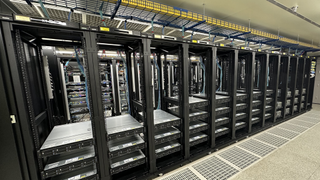Supercomputers
Latest about Supercomputers

Elon Musk restarts Dojo3 'space' supercomputer project as AI5 chip design gets in 'good shape'
By Aaron Klotz published
Elon Musk confirms the restart of the Dojo3 supercomputer project. Success in AI5 chip design has enabled Tesla to start porting resources over to Musk's next-gen supercomputer aimed at "space AI".

AMD and Eviden unveil Europe's second exascale system
By Anton Shilov published
Some racks will even use Rhea2.

Nvidia to build seven AI supercomputers for the U.S. gov't with over 100,000 Blackwell GPUs
By Anton Shilov published
And even more.

Nvidia unveils Vera Rubin supercomputers for Los Alamos National Laboratory
By Anton Shilov published
Vera Rubin forges into supercomputers.

U.S. Department of Energy and AMD cut a $1 billion deal for two AI supercomputers
By Bruno Ferreira published
U.S. DoE and AMD cut a $1 billion deal for two AI supercomputers.

China's supercomputer breakthrough uses 37 million processor cores to model complex quantum chemistry at molecular scale
By Anton Shilov last updated
Chinese researchers used the Oceanlite supercomputer and a custom NNQS model to simulate molecular systems with 120 spin orbitals.

Start-up hails world's first quantum computer made from standard silicon
By Luke James published
A UK start-up says that it has built the world’s first full-stack quantum computer using the same silicon chip technology used in laptops and phones.

Nvidia GPUs and Fujitsu Arm CPUs will power Japan's next $750M zetta-scale supercomputer
By Hassam Nasir published
Nvidia and AI are synonymous.
Get Tom's Hardware's best news and in-depth reviews, straight to your inbox.

